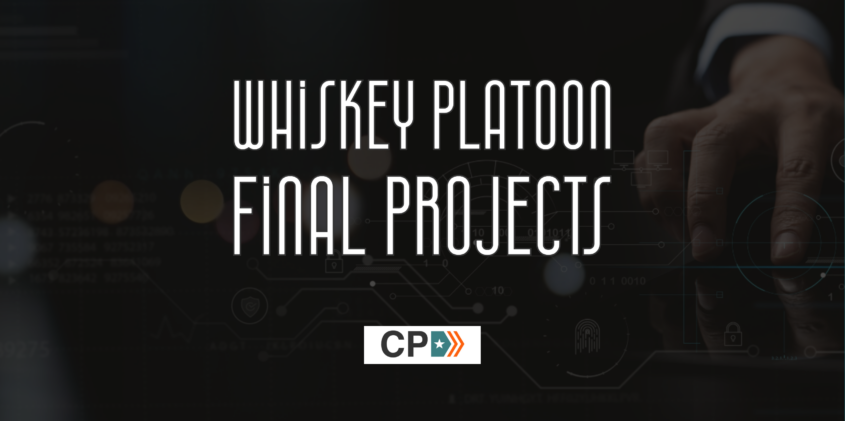Whiskey Platoon Final Projects
For 15 weeks, the Whiskey Platoon graduates dedicated themselves to honing their coding skills during the Full-stack Software Engineering: Immersive program. From AI-driven chess tutors to comprehensive class management tools and real-time chat apps, their final group projects reflect their dedication and growth. Join us in this blog as we explore and celebrate their remarkable accomplishments.
Starting the project showcase strong, Cheap Chess Tutor leverages Artificial Intelligence (AI) to help chess players improve their skills. New players can see suggested moves during real-time games with other players or computers. The app stores its data on a PostgreSQL database, so users can play multiple games simultaneously.
OpenAI powers the computer opponent. The team’s code translates the chessboard into text for ChatGPT 3.5 to analyze, then converts its responses back into JavaScript code, creating interactive visual effects for the user within a second.
“For many of us, this was the first time we had taken somebody else’s code and contributed enough to call it our own,” Drew, an active duty Airman, says. “It required a strong understanding of the code, which we gained through demos, reviews, and most of all, not being afraid to ask questions. Cheap Chess Tutor taught us the versatility needed to jump into any project and thrive.”
ChangeMate platforms social impact events and campaigns in a fun, social layout. The app offers organizers tools to promote their events, recruit volunteers, and assign tasks on a user interface created with React and Veet and enhanced using Bootstrap components.
Individual users are motivated to host, volunteer for, and attend events for social causes by earning badges and recognition from the ChangeMate app. Part of the user functionality uses external and Restful APIs.
“Our vision was for ChangeMate to be more than just a social media platform,” Shawn, an Air Force Veteran and member of the ChangeMate team, says. “ChangeMate is a catalyst for positive change, bringing communities together to create a better world. We’re excited to embark on this journey with our users.”
The next team built Platoon Console, a class management tool for Code Platoon students and instructors. For students, the app streamlines their attendance records, manages pair programming, and provides a detailed class calendar and resources, including a searchable gallery of lecture videos.
“We knew what students need from our own experience,” Landon, a Navy Veteran, says. “We frequently met with our instructors to define the scope of the classroom toolset and what information they need to collect on the platform.”
Based on their user research, the team designed the instructor side of the platform to check and approve attendance, which is stored on a back-end table of attendance records stored in SQL. Instructors can also select students to demo their code and generate random pairs or groups for assignments.
Transparent Budget Decisions (TBD) is a personalized finance app that tracks expenses and forecasts monthly expenses. Before writing any code, the team used Agile methods to determine their project scope.
“We created a whiteboard of potential features and categorized them based on our vision of the minimum viable product,” Weston, a Marine Corps Veteran who worked on TBD, says, “Each feature was broken down into a user story to determine its success criteria from that user’s perspective.”
TBD features an interactive calendar of transaction data and events, graphs the remaining budget using JavaScript against automatically deducted monthly transactions, and uses the Open AI API in the “Ask TBD” page, where users can receive instant answers from ChatGPT.
The last project in our showcase is Disclone, a full-stack chat application designed to provide users with a seamless communication experience. Users can join different channels or create their own. While on a channel, their messages are sent in real-time to other users via a WebSocket server built with Django and a Gunicorn server. The team deployed Disclone on an Amazon EC2 instance, packaged with a lightweight Docker container.
“Rather than focusing solely on creating a feature-rich application with what we already knew, our team saw Disclone as an opportunity to push the boundaries of our skills,” Jordan, an Air Force Veteran and Disclone developer, says. “We challenged ourselves by incorporating cutting-edge technologies we were eager to learn. These technologies not only enhance Disclone’s performance but also represent a significant milestone in our learning journeys.”

